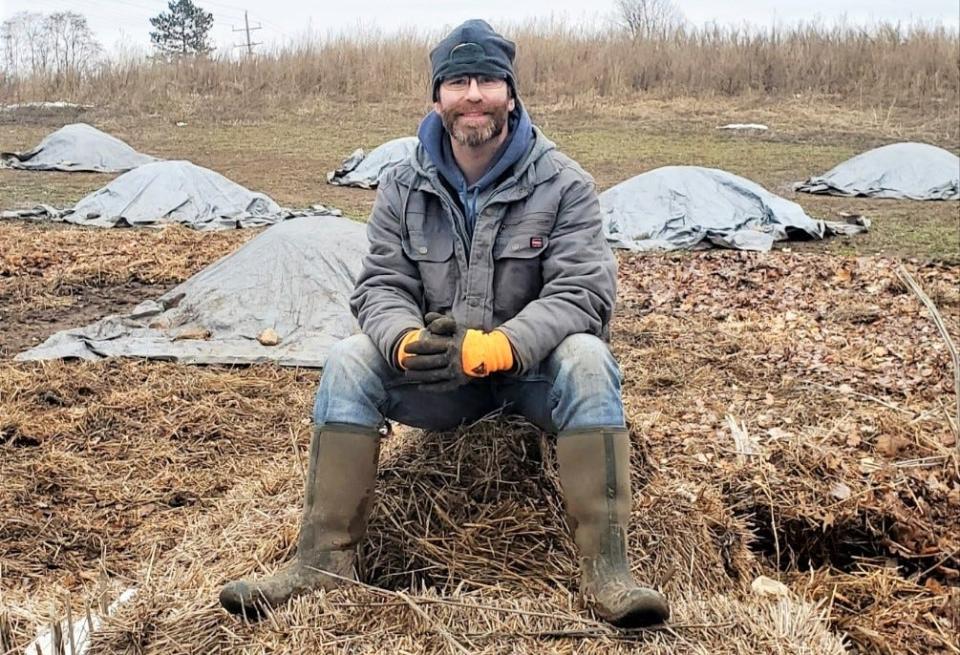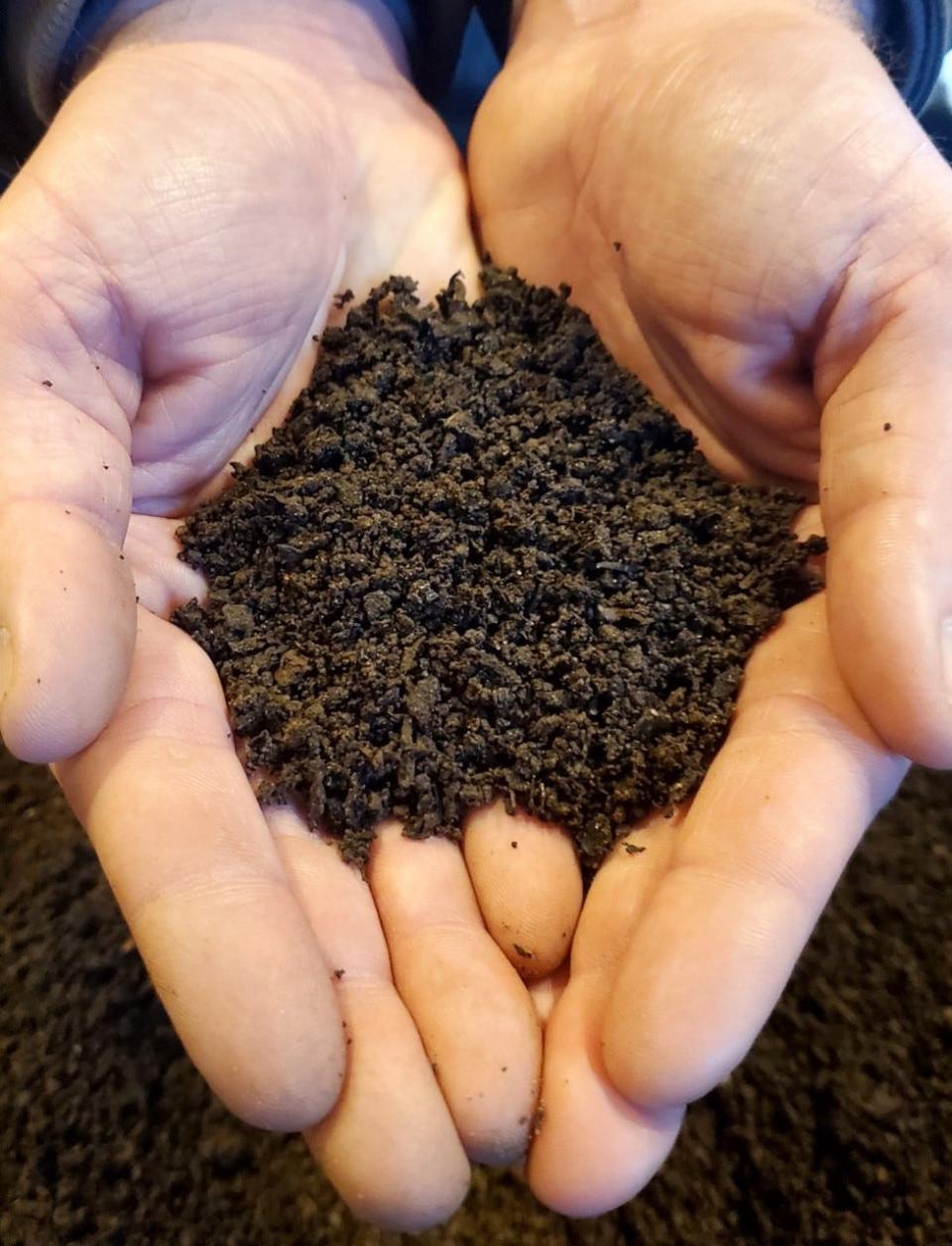Here's how a Green Bay composting company is helping people and companies meet sustainability goals

GREEN BAY − In just under two years, Cory Groshek has grown his Green Bay compost company from a small startup with a handful of clients to a full-fledged business helping residential and commercial customers naturally recycle food waste.
Groshek created Greener Bay Compost in July 2021 and has since grown it from 16 residential subscribers to 142 and five commercial subscribers.
The company lends a hand to the environment by composting tons of food waste and recently added Northeast Wisconsin Technical College and Bellin Health to the list of clients.
Groshek said there are a lot of people who are environmentally conscious and want to help reduce their organic waste. Some of them, he said, don't have the space to do composting properly or the time and that's where he comes in.
"I like to say 'we do the hard and dirty work for you,'" he said.
He said many of his residential clients have told him they've reduced their waste so much they sometimes don't even have to put their garbage bins out.
"That is the reason for which we exist," Groshek said. "Food waste is not garbage and humans never should've thrown food in a landfill."
Groshek, born and raised in Stevens Point, moved to Green Bay with his wife Ashley Groshek about seven years ago. He said he picked up gardening as a hobby to get away from the stress of office work and quickly discovered how expensive supplies were. He thought there must've been a way to reduce the costs, especially for soil and fertilizer.
Then his wife told him about composting — a process that converts organic materials into a nutrient-rich soil amendment or mulch through natural decomposition.
Cory Groshek said it took him some time to create a compost that was of high quality. While he was experimenting, he found a business idea that would allow him to do what he always wanted: own a business, work outdoors and help the environment by keeping waste out of the landfill.
"I like to do physical work, I don't mind getting my hands dirty (and) I like to be outside," Groshek said.
He joined the social app Nextdoor in spring 2021 and asked people who wanted to compost if they would take a five-gallon bucket that he would pick up either every other week or monthly. Some of them subscribed, and he and his wife started picking up buckets with food waste around his neighborhood and composting.
Since opening in July 2021, Groshek said his company has diverted 58,138.41 pounds of waste from the landfill. That is almost 30 tons of waste.
"We are literally weighing every bucket we pick up and keeping track of those weighs on a subscriber list," he said.
A leaderboard on the company's website keeps track of the amount of waste every customer produces. Subscribers can claim one cubic foot bag of sifted compost for free once they've reached 500 pounds of waste.

How much waste goes to the landfills?
The Brown County Port and Resource Recovery Department operates a solid waste transfer station that receives, transports and compacts refuse produced by county residential, commercial and industrial users.
Brown County takes part in a three-way agreement revised and restated in 2020 for the next 20 years with Outagamie and Winnebago counties to share out-of-county waste. This partnership is referred to as the BOW landfill.
Mark Walter, business development manager for Brown County, said there has been a considerable increase in waste from 2020 to 2022.
"We saw a lot of waste go up in 2021, which seemed to be pandemic-related," he said. "Recycling numbers spiked up, garbage numbers spiked up and in 2022 numbers are again higher."
He said that previous to the new landfill that opened in January 2022, Brown County didn't receive as much waste.
"Now we are getting material from a wider source," he said.
Still, he said, in 2021, as shown in the Brown County Resource Recovery annual report, the county processed 336,854 tons of solid waste. The 2022 preliminary report shows a 16% increase, with a total of 392,289 tons of refuse.
"The BOW as a whole went up about 6% in 2022," Walter said.
RELATED:Allegiant expands Appleton airport schedule with flights to Pacific Northwest
RELATED:What's coming to the CityDeck Landing building in downtown Green Bay? ∣ Streetwise
Composting service also helps companies meet sustainability goals
In Green Bay, institutions like Northeast Wisconsin Technical College and Bellin Health have created composting programs as part of their sustainability programs. Both institutions became Greener Bay Compost clients in January and have composted 1,340.95 pounds combined since then.
At NWTC, Garrett Dietz, chair of the environmental stewardship committee, said one of the college's sustainability goals from 2020 was waste reduction. The institution also has a sustainable agriculture program that educates students on how to compost properly and the importance of it.
"Our main goal is to keep as much food waste as we can from the landfills," he said.
Dietz said the contract for seven buckets with Greener Bay Compost started this January and they are "extremely satisfied with the service."
"We (had) tried other composting partners before but (the service) wasn't as consistent," he said.
Dietz's colleague, Nick Steeno, who is the food service director, said the college kitchen uses four or five buckets, The Buzz coffee shop uses one and the rest is for catering leftovers and student meals.
"Most of what we compost is coffee grounds and fruit and vegetables scraps," Steeno said.
Steve Reinders, team leader of Bellin Health's Food and Nutrition Department, said the company decided to hire Greener Bay Compost after Bradley Burmeister, an emergency doctor at the hospital, talked about his residential composting experience with the company.
Reinders said after meeting with Groshek and learning about the service, costs and the system, the hospital agreed to start composting coffee grounds.
"Coffee grounds are something that are very hard for us to get rid off," he said. "You can't really put them down the garbage disposal because they block the lines."
He said the hospital produces "a lot" of coffee grounds, and with Groshek's service they have found a "good solution."
Reinders said they started with seven buckets, but quickly realized it wasn't going to be enough. The hospital also added fruits and vegetables to the compost.
"We are up to 12 buckets now and we've added our salad areas," he said. "It's a really easy method, and it works great for us."
Groshek said the final product — the sifted compost — takes about 13 to 14 weeks, depending on weather. He sells the compost directly through the website or at the stores Soul Purpose, Roots on 9th and the Botanical Garden gift shop in west Green Bay.
Ready to get started? Here are service options for residential and commercial
Greener Bay Compost's residential service includes one bucket with wood shavings in the bottom — to control humidity — that can be picked up and replaced once a month for $15 or every other week for $20. Extra buckets costs $12.50 per month per bucket.
For commercial businesses the cost is $70 per month for two buckets, with pickups every Tuesday. Extra buckets cost $15 per bucket. Clients also receive a 20% discount for the company's one gallon or one cubic foot bags of compost, which are sold for $6.99 and $34.99 plus tax, each.
This service is only available for businesses and residents in Green Bay, Allouez, Ashwaubenon, Bellevue, De Pere, Hobart, Howard, Ledgeview, or Suamico. Those outside of the areas can opt for the drop-off only option with a 24- to 48-hour prior notice of 24 to 48 hours; this means the client itself can call and let the company know they are coming to retrieve drop and pickup. The cost for this is the same.
For more information, visit gbcompost.com or follow along on Facebook and Instagram.
Ariel Perez is a business reporter for the Green Bay Press-Gazette. You can reach him at APerez1@gannett.com or view his Twitter profile at @Ariel_Perez85.
This article originally appeared on Green Bay Press-Gazette: NWTC, Bellin Health use Green Bay compost service to reduce food waste
